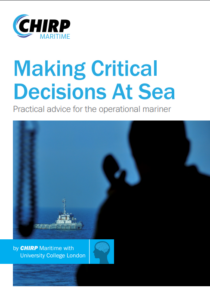CHIRP Maritime published a paper named ‘Making Critical Decisions at Sea’ addressing how an operational mariner, during a critical situation in the middle of the sea, will be able to improve their decision making.
The paper was issued in collaboration with the Arts & Sciences and Neuroscience Departments at University College London.
Overall, the report focuses, further explains and covers the following:
- making critical decisions as an individual;
- making critical decisions as a group communicating in challenging conditions;
- creating a positive error culture around mistakes and responsibility;
- understanding the role of intuitive decisions;
- how to develop critical decision-making abilities through training.
The booklet provides a guide for seafarers and introduces new techniques and skills that they can develop to enhance their job performance.
Also, CHIRP highlights that cohesiveness and inclusivity within the group it is important to emphasise shared goals. This can happen early on, for instance by taking opportunities to stress joint tasks and even simply by using the first-person plural for shared tasks and goals.
We can avoid accidents by creating an environment where reporting mistakes and discussing them is welcomed and leads to better understanding of processes, avoiding the same mistakes in the future
… the booklet notes.
It is aimed at operational mariners as a guide to improving the decision making process by encouraging a more inclusive team environment. The ‘cockpit culture’ scenario of uncontested hierarchy, otherwise known as crew resource management, is where subordinates are less likely to question their superiors which in turn increases the possibility of negative-result decision making.
Except onboard personnel, the paper is useful to shore management where the master may contact and might lead to poor onboard critical decision making.
The confidential reporting program CHIRP Maritime has published a paper titled Making Critical Decisions at Sea – a summary of findings and recommendations in collaboration with the Arts & Sciences and Neuroscience Departments at University College London.
Moreover, CHIRP discusses the ‘positive error culture’ as a way forward and also compares with other safety critical industries.
Captain Jeff Parfitt, Director (Maritime) CHIRP commented
It is hoped that this guide may go some way to encouraging team members, regardless of their discipline, to engage with the decision making process and thereby contribute and build a better team environment. The ability to perceive the world around us and to make decisions, both individually and as a crew, is crucial for us to carry out our jobs and to avoid or respond to emergency situations.
Concluding, the paper is in line with 2018’s published booklet ‘Perception, Decision Making and Fatigue at Sea‘ which focused on how we see, and how the resulting perception is affected by the conditions seafarers face and how this affects their decision making.
To explore more, click on the PDF herebelow
































































